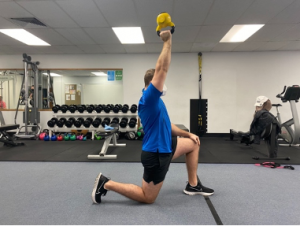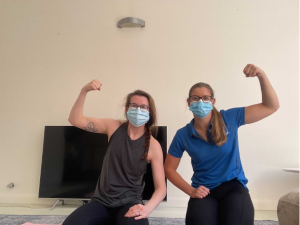Annabel investigates… Sleep
Sleep…how much sleep should we be getting? What are the benefits? And how does it link to exercise?
Sleep plays a vital role in your physical and mental health. Being able to get a good quality sleep, empowers the body to recover efficiently and allows the body to be refreshed for the next day. On average, adults should get between seven and eight hours sleep at night. The data shows that only two in three adults achieve this length of sleep per night (E. Kline, 2014).
Today, Annabel and the Longevity Exercise Physiology teams at Drummoyne, Edgecliff, Marrickville, Bella Vista, Randwick, Pymble, Balmain and Neutral Bay discuss the key impacts that sleep can have on exercise and the benefits it can have when you get efficient amounts at night.
Being able to get sufficient levels of sleep is essential for optimal health. While we sleep, we consolidate information, and our body restores our nervous, immune, skeletal, and muscular systems. As we can see from the vast number of systems that our body restores during our sleep, this can predispose individuals to cardiovascular disease, metabolic dysfunction, psychiatric disorders, and early mortality if we are not getting adequate amounts of sleep. Poor sleep can stem from factors including sleep disorders, medical conditions, and mental health. Poor sleep issues affect people of all ages and impacts can be far reaching (Ho, 2019).
Exercise has a vast amount of health benefits, is easily accessible and is a minimal cost and has little side effects. Exercise is a non-pharmacologic treatment option for those who experience disturbed sleep (LeWine, 2019). Recent research has been able to identify that those who experience poor sleep, find it more difficult to be physically active, accentuating the bi-directional relationship between exercise and sleep. About 1 in 5 Australians have negatively affected sleep (E. Kline, 2014). This could come in the form of disorders such as Obstructive Sleep Apnoea, Insomnia and Restless Leg Syndrome. These are just a few factors that can contribute to poor sleep, and studies have shown that exercise can have a positive impact on these disorders (LeWine, 2019).
“On average, adults should get between seven and eight house sleep at night. The data ultimately shows that only two in three achieve this”
Timing of your exercise is important, it is said that exercising 4-5 hours before you head to bed is the perfect time, as it allows the body enough time to sufficiently cool down which leads to a better quality of sleep. When you get a better and deeper sleep, this will allow for more energy throughout the day leading to greater chances of motivation to exercise, which results in a positive cycle of quality sleep and regularly working out (Pacheco, 2022). A study found that participating in physical activity at night did not affect sleep, it helped people fall asleep faster and spent longer in deep sleep. Although, the intensity of exercise should be taken into consideration, in which those who undertook high intensity training, less than an hour before bed, took longer to fall asleep and had poorer sleep quality. Therefore, identifying that strenuous physical activity should be avoided in the late evening for better sleep hygiene habits (Pacheco, 2022).
Exercise helps reduce stress along with anxiety and other mental health conditions, as well as improve quality and duration of sleep.
In addition, a good night sleep assists in recovery after exercise. This is because, during your sleep, energy is restored in the muscles. Another study states that sleeping allows your brain to form memories, which is related to the amount of REM sleep you get (Ho, 2019). During exercise your core body temperature increases and after you stop it begins to cool. This is a similar action that occurs when you sleep. The similarity between these changes signals your brain that it is time to sleep.
As well as this exercise relieves symptoms of anxiety and depression. Symptoms of these conditions include anxious thoughts, worry, stress and can interfere with one’s ability to fall asleep. Exercise can mitigate these symptoms through the release of endorphins, positively improving sleep quality. Deep sleep is the stage where your body restores and replenishes itself, healing your muscles and tissues to prepare for more exercise (LeWine, 2019).
It is important to make sure we have a balance of sleep and exercise within our daily routines for a healthy habit to be formed. Getting the right amount of sleep per night is vital for all individuals. As we have seen throughout this article, sleep and exercise have a large bi-directional relationship, therefore without one or the other we are going to have negative effects. It is important that you seek professional advice if you are having poor sleep or struggling to start an exercise program due to poor sleep.
If you have poor sleep or want to know how you can improve your sleep quality through an individualised exercise program give Longevity Exercise Physiology Edgecliff, Pymble, Marrickville, Randwick, Drummoyne, Balmain, Bella Vista, and Neutral Bay a call on 1300 964 002 to book in a session today.
Written by Annabel Bergman
References:
Ho, K. (2019). One in three Australians not getting enough sleep. Retrieved 24 March 2022, from https://au.yougov.com/news/2019/03/21/one-three-australians-not-getting-enough-sleep/
Howie, E.K., Joosten, J., Harris, C.J. et al. Associations between meeting sleep, physical activity or screen time behaviour guidelines and academic performance in Australian school children. BMC Public Health 20, 520 (2020). https://doi.org/10.1186/s12889-020-08620-w
Kline, C. (2014). The bidirectional relationship between exercise and sleep: Implications for exercise adherence and sleep improvement. AM Journal Of Lifestyle Medicine, 8(6), 375-379.
LeWine, H. (2019). Does exercising at night affect sleep? – Harvard Health. Retrieved 24 March 2022, from https://www.health.harvard.edu/staying-healthy/does-exercising-at-night-affect-sleep
Pacheco, D. (2022). Exercise and Insomnia: Can Physical Activity Combat Insomnia? | Sleep Foundation. Retrieved 24 March 2022, from https://www.sleepfoundation.org/insomnia/exercise-and-insomnia
Pacheco, D. (2022). How Can Exercise Affect Sleep? | Sleep Foundation. Retrieved 24 March 2022, from https://www.sleepfoundation.org/physical-activity/exercise-and-sleep




